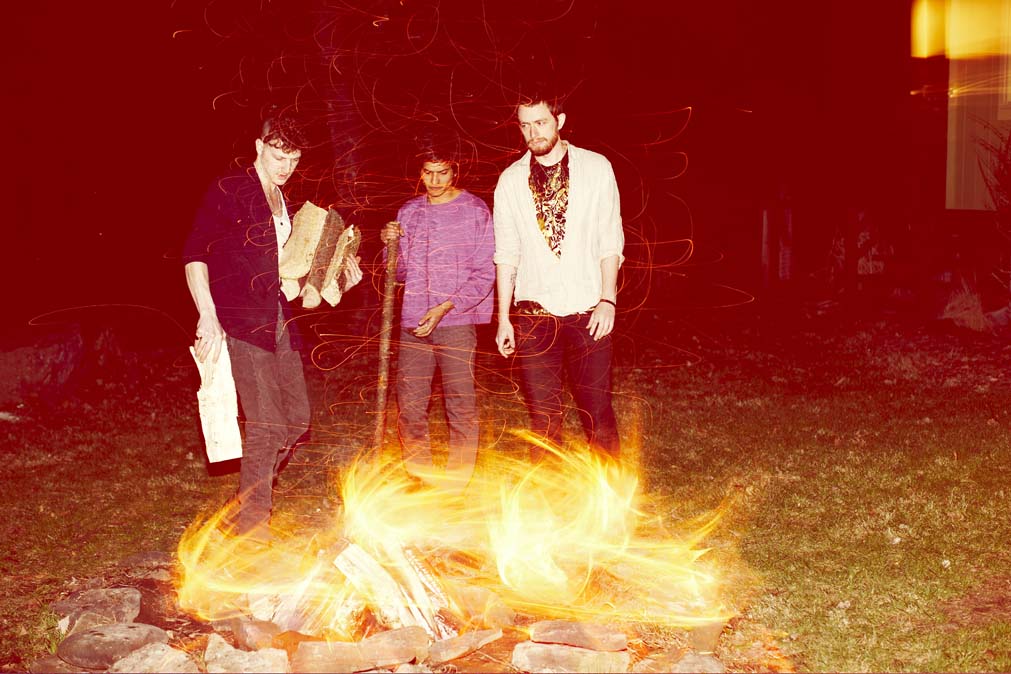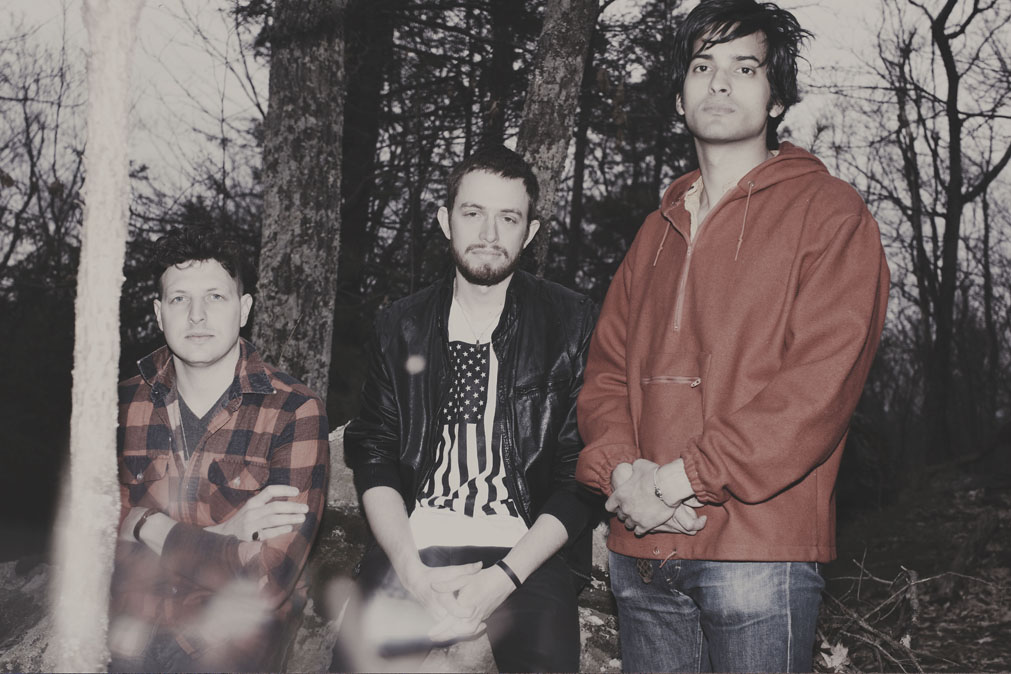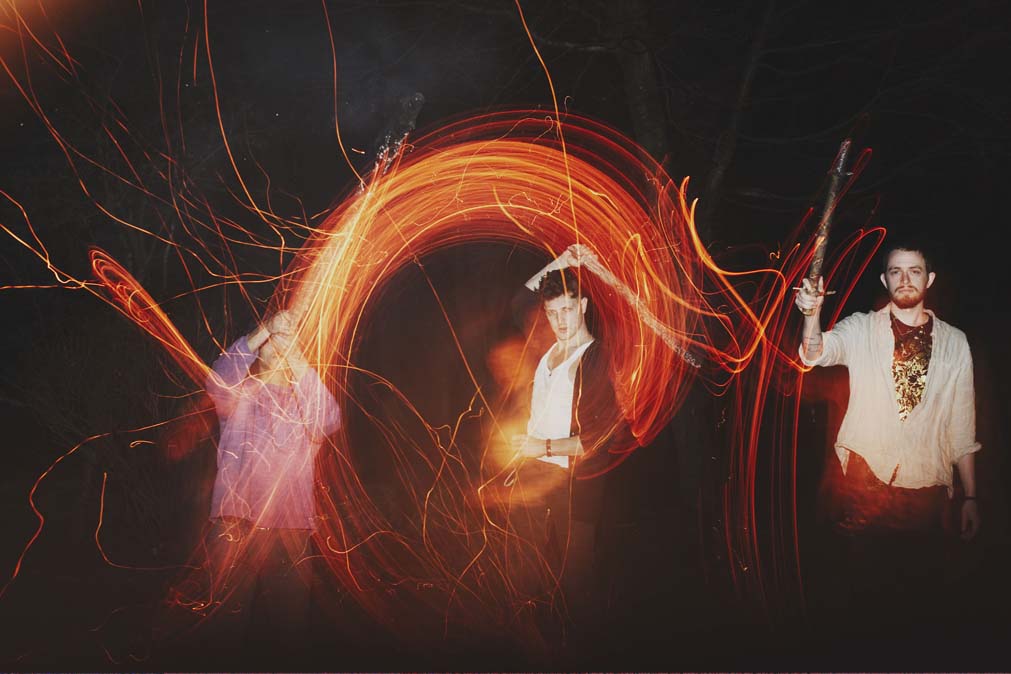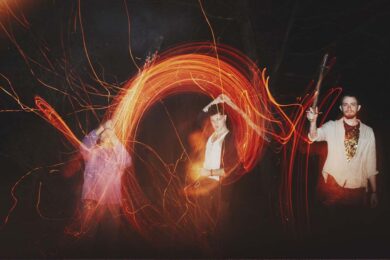Since the release of their critically acclaimed 2007 debut All Hour Cymbals, Yeasayer have been around the world and back again with their experimental ambient world sound. While their first record was conceived in total artistic isolation, constant touring has forced Yeasayer to engage with their contemporaries. Their follow up, Odd Blood [out this month], sees the band contend with pop’s current dialogue as they strip back the wall of sound that undulated from their debut and produce something simpler and more translatable to the wider audience.
We caught up with Ira Wolf Tuton and Chris Keating over a steak dinner and cup of tea to talk politics, pop and their new musical language.
Do you pay much attention to the media?
Ira Wolf Tuton: Not very much. I don’t know, it’s kind of like, what’s the point? And even if I don’t pay attention I still hear about it. But no, not really at all. Things that are said are so different in the UK and the US. There is a Warhol quote: "You don’t read your reviews, you weigh them," so I just think it’s kind of funny that side of it. I find it entertaining, but that’s not my motivation and I don’t ever want it to be.
So what is your motivation?
IWF: Just working with these guys and continuing to making records, trying to move on creatively and artistically and push each other. And hopefully, that being said, we do want to elicit a reaction, I don’t want to be boring. We don’t want to be a boring band. So whether negative or positive I just value people’s strong reactions to what we are doing. For me, my way of relating to people is in making the record and then letting it go; and then it goes out into the ether for all these other people to listen to. Then we have to do our live show and that’s how I connect to people besides sitting here with you of course.
So you’ve survived the initial MySpace and blog buzz, are you happy with the way things have been going?
IWT: I’m happy to the extent that we are doing it as a living. I think that the people that we have allied ourselves with, along with the new label, we have maintained our own way of doing things. Nobody has been breathing down our neck to go any way that we don’t want to go and that’s kind of it. The point where we don’t have totally control over what we are doing, things have got to change.
So far so good: the goal at the beginning was just so that we could do it full time and we have been doing that. It’s very much in the natal stage and we are only two albums in. I think we have made to pretty different albums. I would like to make three different albums, four, five…
So if there a manifesto to the band with regards to that?
IWT: I think it’s just to continually keep creatively moving and keeping open to experimentation, maybe focussing on different influences and maintain a very broad spectrum, focussing in on different ones from project to project and just never to repeat ourselves. I don’t want to be that kind of band that’s boring. If you liked what we did on our first album, you can get our first album.
I just want to be exposed to more people, play in front of more people, and play in places that we have not played in before. Each step of the way opens up more possibilities that you never knew existed constantly.
Did you all have the same influences and ideas at the start and where you wanted them to go in Odd Blood?
IWT: I think the similar influences are there, but we have not focused on the same tones. We also wanted to focus on 90s dance music and production-wise get the low end thumping a little bit better. We also wanted to be more concise with our song writing and arrangement.
Chris Keating: It’s kind of a funny idea that you have influences for an album or a project or a time period your influence is permanently forever. I think we sought out to make a specific sounding record the first time based on it, and then once it was done it’s like, OK that’s sort of what we were trying to do so having diverse tastes we keep on kind of moving. I think there are over laps between the new record and the last one but it’s drawing on some different things and trying to do different things.

Why do you think that there has been this burgeoning scene of new wave music coming out of the New York areas to the latter part of this decade?
IWT: I think a lot of Brooklyn is a place where, well at the time of recording our album, a lot of people were tired of the same sort of shtick of rock and Joy Division sounding bands.
CK: Like a lot of moody rock was coming out of New York at the time with The Strokes having a lot of success and Interpol being the cool band. Every club you went to it was just that scene. And still and lot of great stuff, but what ever, you were kind of like [makes nonsensical noise and shrugs shoulders]. I like Joy Division, I like New Order, that stuff’s awesome. But every time you went out to a bar and you would here New Order or The Strokes or Interpol and you would be like "OK."
IWT: I didn’t grow up just listening to that kind of stuff and wanting to regurgitate that music. I think all of us grew up exposed to a lot of different stuff, and continually with the way our media accessibility is now we continually try and expose ourselves to as much diversity as possible because it’s so important.
Is that why Odd Blood has more of a contemporary feel to it than the world music sound of All Hour Cymbals?
IWT: I would like to think so. I think it’s important for us to be contemporary and we use as much contemporary recording technology as we can. I think we are trying to engage more with contemporary society and our contemporary peers. Yeah, it’s important. We are not trying to be retroist or ironic in any way.
CK: We always try to do that. We always try to be influenced by things like the 60s and 70s, but I guess its just the production techniques are a little more contemporary.
Odd Blood is quite a departure in the fact that it is quite simpler in form. Why did you decide to move away from the wall of sound that your created in your debut?
CK: The first album was such a wall of noise and we couldn’t do anymore with it so we tried to strip it away. I think our nature of working still makes it kind of dense. Creatively it was a departure and it was a challenge to try and do it and simplify. I think our record label was surprised. They said that they thought we were going to try and make a pop album but they didn’t think we would. To me it was a challenging process and fun to try and not hide behind the haze that some people really liked. We didn’t want to do it again.
Did you struggle to restrain yourself to that effect?
IWT: It was more of a difficult album in that we understood that we were going to play this on the road for a while and that’s important. Having played that first album for a long time I think we reinterpreted a lot of the material to be more physical when we played it live because you don’t want it to be a soundscape on the stage for an hour.
CK: There’s more music that is inspired by dance music production or electronic music that we like. That’s all been a big influence on what we do and I don’t think that really come through on what we did initially. Maybe we didn’t give people that access point for that set of influences because it’s not always there.
You’ve said that you thought you made a lot of mistakes on the first record: do you think that you managed to counter them in Odd Blood?
CK: We made mistakes on this album too. There are good mistakes and there are bad mistakes. We used a really old PA system for the first record and after we recorded the vocals we would plug it through this really old, crappy 70s PA and a lot of the stuff that came out of it sounds really weird now and we are like did we do that? But at the time it was like this is cool. And those are mistakes, and those conscious things that you are doing at a time and in hindsight that worked for the record.
IWT: And if your approach is constantly experimental you are not going to hit the nail on the head all the time. That’s the way we work, that’s how we get the thing that turns out to be like "Man, how did we do that?" We really achieved something special on that album, but nobody’s perfect.
CK: It’s cool. Like some of the accidents that happened during recording are some of the best stuff. And I think that, in art or whatever, happy accidents like that are just cool. That’s how you get ideas that you would not consciously think of.
Are you trying to punt for the mainstream with this record then?
CK: It’s not so much to hit a mass audience, but was more to engage in that dialogue. I like some radio stuff: I like some Kanye West songs, Rihanna and different production techniques. I still don’t think these songs, I mean maybe I’m wrong, but I still don’t think that our songs appeal to a mass audience and we still kind of go for some kind of humour and horror, something a little abstract and a little uncomfortable. But I don’t think that’s what the mass audience embraces. We are always trying to reach more people, but I don’t think that we keep that in mind. We don’t want to play stadiums.
You used your vocals more for melody and harmony on All Hour Cymbals, but they come through a lot clearer on this record. Why is that? Is there more meaning to what you are singing?
CK: I think it’s kind of more personal. We have tried to write like weird love songs, tried to have songs that have stories, just basically different to what we did on the first record. I felt like people got the first record: it’s apocalyptical, it’s rejoice, it’s a mash up of culture thing. You don’t need to keep repeating that theme and we didn’t want to. It’s not childish for us to write a love song, it’s hard for anybody, it’s hard not be cheesy and do something new.
Was it as awkward as I imagine it being writing a love song?
CK: Writing songs can always be awkward.
IWT: I mean, I don’t think that we have a relationship amongst each other were Chris starts talking about how he loves his wife and we are like ‘that’s stupid’.
CK: We are in a place where we are all in relationships now as opposed to the first record where I was kind of trying to get out of a relationship. Everyone is in a different headspace now.
You were predicting quite the apocalyptical end in ‘2080’ thanks to President Bush. Are you happy with the new administration?
IWT: I don’t think you can ever be happy with things.
CK: Especially in a country like that so…
IWT: It’s so bureaucratic.
CK: I like Obama. I like what he stands for, but I don’t know if he has achieved well. I mean he has been there for less than a year and everyone seems to wonder why the world hasn’t changed yet. I saw in the first few months little changes and specifically stuff like more funding for good stuff and less funding for bad stuff.
In terms of like turning things around, Bush really fucked the world up and here is the guy who is here to clean up after the O.K. Corral. He has been in there for 20 minutes and people are like "Why are you not all cleaned up yet?"
IWT: And as unifying a figure he seems to be around the world he has been very much been co-opted into a bipolarising figure amongst the bureaucracy and politics of America. Still it doesn’t take one guy. America elected pretty much the noblest one into a very much corrupt political bureaucracy.
He’s pretty much split everyone with the medical bill that he is trying to push.
CK: He has been going for it but I don’t think it’s really up to him. You have all those states that have their own little petty bullshit, so he came out and really put himself on the line with this. Every state is really different and then there are all those conservative fractions that want him to fail no matter what and they are going to vote against everything he does even if it is in their interest. Pretty much the same as what they did with Clinton, they are just going to try and get him. And I respected Clinton – he was a smart guy.
IWT: He had a brilliant mind.

You’re not gigging in the UK at the moment, so what brings you here?
IWT: You.
I’m touched.
IWT: Originally we came here to do a radio edit, but we are talking to the press about our manifesto, eating rib eye steak.
CK: How is it?
IWT: Good. I’m loving it.
CK: I had a horse steak last night.
Nice. You’ve toured with the likes of Beck, MGMT, Bat For Lashes recently. How did it all go for you?
IWT: So far so good. We are all still friends with those people. I mean, I’m not calling up Beck Saturday night to hang out with him.
CK: I am.
IWT: Really? Damnit. I knew I should have got him a birthday present.
How was your UK stint with Bat For Lashes?
IWT: It was cool to open up and at the time when she asked us we had nothing to do so.
CK: To play for half an hour to a crowd that is not really our crowd it’s not all that fun but it was cool. The Roundhouse show was great. I like Natasha and her whole band so it was really cool.
And you worked with her on Two Suns.
CK: I did some drum programming and some of the beats.
IWT: I played bass.
How did it all come about?
IWT: We met here in Amsterdam originally two years ago during that Beck tour. I think she was touring with Radiohead at the time and we just hung out and shit. She called us and was interested in us coming in to help out.
CK: She doesn’t need help with writing so she just wanted a little help in the studio. She records everything on a little tape recorder with a little keyboard attached to it.
IWT: Some times I just think that the songs just needed a beat or a bass line and some times they just needed me or Chris to be like "That’s good".
CK: We were kind of like consultants. New York stamp of approval.
You’ve described your music as ‘Middle Eastern-psych-snap-pop’ and ‘Enya with bounce’ on your MySpace. How would you honestly describe your music?
IWT: That’s your job.
I’ve tried.
IWT: What’s the point in setting yourself limitation and kind of defining it. That’s not really what its about.
CK: If I could come up with some word like ‘new wave’ that really sums up what is going on with our stuff I would do it, but I don’t know it is just sort of silly all the terms. All those terms are applied to bands and we hear that band’s track and [the band] are like ‘We hate that term new wave’. I just think that it’s human nature to want to categorise things – it just makes it easier, it divides the brain.
Do you feel like your music has lost some of its transcendental element as a result?
CK: I like to think that all music is transcendental in a way. A good song will take you to a new different place for your mind to wander and get lost in it. Ideally there are parts in there where you are dancing or you are getting lost in the sound. That place where you are like on the first couple of tracks on Kid A and you are like "What the hell is going on?"
IWT: I don’t know if transcendental is the right word but just listening and getting strong emotions from song to song.
Are you working on new material?
IWT: As soon as the record is mastered it is a case of how we interpret the recording into the live show and that is a big process of rearranging. We are always trying to think what is the next thing and what do we want to explore next.
CK: I mean Kid A what a departure that was. I would love to make something like that. I listen to that now and I am kind of like "Wow". I mean even after OK Computer it’s just so cool.
We are always working on new things. I have a laptop computer with me on the road and make little bits and then save it. After about three or four months you have like a hundred of them and one of those ends up being part of every little song.
So you’ve lost Luke Fasano from the original line up. Did that make any difference in writing this new material?
IWT: Do you know where he is?
It’s been a while since we’ve spoke, so no.
IWT: It was kind of a working relationship that didn’t fit. In many ways we…
CK: We had a few drummers in before Luke joined the band when we were playing in New York and stuff. It worked out great live but it was always that creative part was weird. I think that Luke always felt like an outsider and it was a case of our creative attitudes was not meshing.



